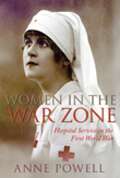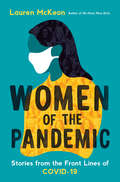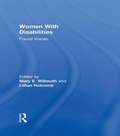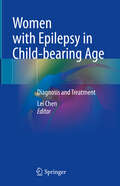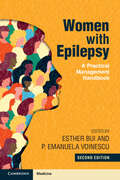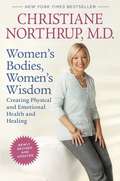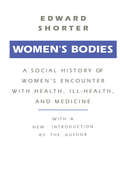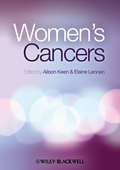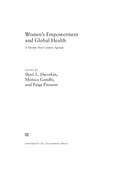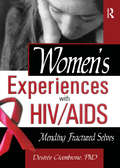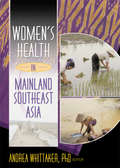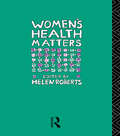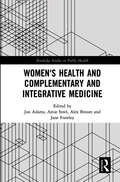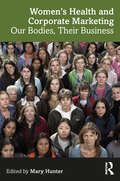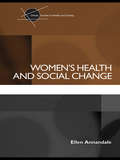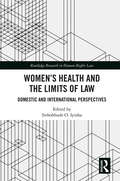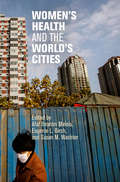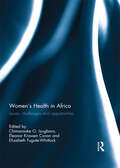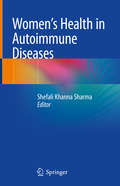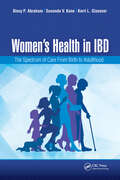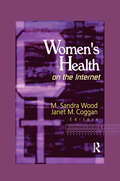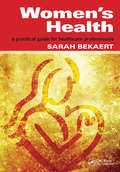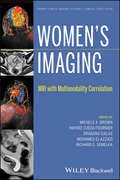- Table View
- List View
Women in the War Zone: Hospital Service in the First World War
by Anne PowellIn our collective memory, the First World War is dominated by men. The sailors, soldiers, airmen and politicians about whom histories are written were male, and the first half of the twentieth century was still a time when a woman's place was thought to be in the home. It was not until the Second World War that women would start to play a major role both in the armed forces and in the factories and the fields. Yet there were some women who were able to contribute to the war effort between 1914 and 1918, mostly as doctors and nurses. In Women in the War Zone, Anne Powell has selected extracts from first-hand accounts of the experiences of those female medical personnel who served abroad during the First World War. Covering both the Western and the Eastern Fronts, from Petrograd to Basra and from Antwerp to the Dardanelles, they include nursing casualties from the Battle of Ypres, a young doctor put in charge of a remote hospital in Serbia and a nurse who survived a torpedo attack, albeit with serious injuries. Filled with stories of bravery and kindliness, it is a book that honours the often unsung contribution made by the female doctors and nurses who helped to alleviate some of the suffering of the First World War.
Women of the Pandemic: Stories from the Frontlines of COVID-19
by Lauren McKeonThe story of the pandemic is the story of women. This riveting narrative offers an account of COVID-19, reminding us of women's leadership and resilience, reflecting back hope and humanity as we all figure out a new normal, together.Throughout history, men have fought, lost, and led us through the world's defining crises. That all changed with COVID-19. In Canada, women's presence in the response to the pandemic has been notable. Women are our nurses, doctors, PSWs. Our cashiers, long-haulers, cooks. In Canada, women are leading the fast-paced search for a vaccine. They are leading our provinces and territories. At home, they are leading families through self-isolation, often bearing the responsibility for their physical and emotional health. They are figuring out what working from home looks like, and many of them are doing it while homeschooling their kids. Women crafted the blueprint for kindness during the pandemic, from sewing masks to kicking off international mutual-aid networks. And, perhaps not surprisingly, women have also suffered some of the biggest losses, bearing the brunt of our economic skydive. Through intimate portraits of Canadian women in diverse situations and fields, Women of the Pandemic is a gripping narrative record of the early months of COVID-19, a clear-eyed look at women's struggles, which highlights their creativity, perseverance, and resilience as they charted a new path forward during impossible times.
Women with Disabilities: Found Voices
by Mary E. Willmuth Lillian HolcombBoth women with disabilities and women professionals who work with persons with disabilities address many concerns about life with a disability and issues related to disability and psychotherapy. Annotation c. by Book News, Inc., Portland, Or.
Women with Epilepsy
by Frcpc Esther Bui Autumn KleinThere are unique challenges to the care of women with epilepsy, including the gender-specific influences that women may experience owing to their age, hormonal status, and co-morbidities. Pregnancy is also a very important time for many women with epilepsy. This textbook is a portable, essential guide to the practical management of women with epilepsy. Busy clinicians can access a wealth of information summarized in a succinct and easily accessible format. Experts from around the world have reviewed and synthesized the available data from studies in hormones in epilepsy, pregnancy registries, and many aspects of the care of women with epilepsy from adolescence, through pregnancy, to menopause. Of interest to all who care for women with epilepsy, including neurologists, internists, obstetricians, anesthetists, primary care practitioners, nurses, and lactation consultants.
Women with Epilepsy in Child-bearing Age: Diagnosis and Treatment
by Lei ChenThis book aims to collect research findings and provide insightful recommendations on various aspects of female epilepsy patients of childbearing age. This book discusses multidisciplinary effort of brain science, reproductive medicine, endocrinology, drug metabolism, genetics, maternal and infant medicine, etc. This book is written by a multidisciplinary team of researchers who had a passion for improving the quality of life of women with epilepsy, to demonstrate the latest scientific discoveries and precise management strategies for women with epilepsy in child-bearing age.
Women with Epilepsy: A Practical Management Handbook
by Esther Bui P. Emanuela VoinescuThere are unique challenges to the care of women with epilepsy, including the gender-specific influences that women may experience owing to their age, hormonal status, and co-morbidities. Many healthcare providers are not informed about the unique issues facing women with epilepsy. This new edition comprehensively reviews the impacts of epilepsy at different life-stages, from adolescence, through pregnancy and to menopause, highlighting appropriate therapies. The book covers topics including managing patients' fertility and preconception counselling, obstetric and fetal monitoring and post-partum seizure management. Chapters on drug-drug interactions, the effect of hormones and anti-epileptic drugs have been thoroughly updated according to new guidelines. Information is presented practically, with bullet points allowing readers to access take home messages easily. This is a highly practical, up-to-date and concise manual for the practical approach in caring for women with epilepsy aimed at general practitioners, midwives, obstetricians, general neurologists, and anesthetists.
Women's Bodies, Women's Wisdom: Creating Physical and Emotional Health and Healing
by Christiane NorthrupFrom External Control to Inner Guidance The Anatomy of Women's Wisdom Women's Wisdom Program for Flourishing and Healing.
Women's Bodies: A Social History of Women's Encounter with Health, Ill-Health and Medicine (Pelican Ser.)
by Edward ShorterWhat has been the source of women's oppression by men? Shorter argues that women were victimized by their own bodies. Exploring five centuries of medical records and folklore from Europe and the US, he shows how pregnancy, childbirth, and gynecological disease have kept women in positions of social
Women's Cancers
by Alison Keen Stanley B. Kaye Elaine LennanPatients with breast and gynaecological cancers have to contend with a large number of difficult and challenging issues. To help them to do this it is vital that their health carers are fully informed in all aspects of women's cancers. <P><P>This book provides a comprehensive and meaningful picture of this oncological area, including epidemiology, histopathology, staging, genetic predisposition, sexual function, fertility, treatment and management, survivorship, and palliative care. To give this book added credibility and holistic application, contributions of women with cancer have been included, and the text is interspersed with patient accounts and experiences.Women's Cancers is essential reading for all nurses and health care professionals working in cancer care settings, as well as patients and families.
Women's Empowerment and Global Health: A Twenty-First-Century Agenda
by Monica Gandhi Paige Passano Shari DworkinWhat is women's empowerment, and how and why does it matter for women's health? Despite the rise of a human rights-based approach to women's health and increasing awareness of the synergies between women's health and empowerment, a lack of consensus remains as to how to measure empowerment and successfully intervene in ways that improve health. Women's Empowerment and Global Health presents thirteen multidisciplinary case studies that demonstrate how science and advocacy can be creatively merged to enhance the agency and status of women. The content is enriched by ancillary videos that give background about programs in India, the United States, Mexico, Nicaragua, Zimbabwe, and South Africa. Women's Empowerment and Global Health provides the next generation of researchers and practitioners, as well as students in global and public health, sociology, anthropology, women's studies, law, business, and medicine, with cutting-edge and inspirational examples of programs that point the way toward achieving women's equality and fulfilling the right to health.
Women's Experiences with HIV/AIDS: Mending Fractured Selves
by Desiree Ciambrone R Dennis ShelbyMeet the women behind the statistics!Women's Experiences with HIV/AIDS: Mending Fractured Selves examines the impact of HIV/AIDS on women, the fastest-growing subgroup of the HIV-infected population of the United States. Based on interviews with HIV-infected women, the book gives voice to their experiences. This powerful text offers a firsthand view of what it is like to live day-to-day as a woman with the added burden of HIV/AIDS.Women's Experiences with HIV/AIDS is a powerful and compelling look at the day-to-day struggles of 37 women infected with HIV. Their stories detail their ongoing efforts-with varying degrees of success-to come to grips with the disease as they try to rebuild their lives. Through qualitative analysis, the book demonstrates the importance of relational resources, such as AIDS activism, support groups, and social support. It also addresses potential problems for women associated with caregiving and presents ethnographic research findings on the complex factors that affect women with HIV (socioeconomic status, sexual preference, lifestyle differences). Women's Experiences with HIV/AIDS also addresses research topics such as: how HIV infection affects a woman's sense of self how women repair disruption and restore identities the limits to women's coping strategies and whether those strategies still work if women become functionally impaired or develop AIDS how women's structural and social environments facilitate or impede repair the role of women's informal networks in biological disruption and repairA rare look at the experience of women infected with HIV (most studies focus on male samples), Women's Experiences with HIV/AIDS is an invaluable academic resource as a course supplement in the fields of medical sociology, women's studies, public health, and community health, and is an enlightening read for everyone interested in HIV/AIDS research.
Women's Health Companion to Maternal-Child Nursing Care: Optimizing Outcomes for Mothers, Children, and Families
by Shelton M. HisleyA unique emphasis on optimizing outcomes, evidence-based practice, and research supports the goal of caring for women, families and children, not only in traditional hospital settings, but also wherever they live, work, study, or play. Clear, concise, and easy to follow, the content is organized around four major themes, holistic care, critical thinking, validating practice, and tools for care that help students to learn and apply the material.
Women's Health In Mainland Southeast Asia
by Andrea WhittakerA thought-provoking look at women’s health in developing nations! This book shows how war, military regimes, industrialization, urbanization, and social upheaval have all affected the choices Southeast Asian women make about their health and health care. When you read these first-person accounts from Thailand, Cambodia, Vietnam, and Burma, you’ll be drawn into the lives of women dealing with drastic changes in their societies. The meticulous case studies in this book examine how social, cultural, and economic forces contribute to the way women make personal health care decisions. Women’s Health in Mainland Southeast Asia offers a thought-provoking look into the lives of women in this developing part of the world. Topics addressed in Women’s Health in Mainland Southeast Asia include: a proposed new approach to women’s health, where treatment is determined by society, culture, and gender rather than by biology alone the relationship between menstruation and other aspects of life for Burmese women the politics of abortion in Thailand the difficulties of seeking care for reproductive tract infections in Vietnam the influence of local culture on the treatment of reproductive health problems in northeast Thailand occupational health hazards faced by women working in the electronics industry in northern Thailand the links between migration, sex work, and HIV/AIDS among female garment factory workers in Cambodia
Women's Health Matters
by Helen RobertsWomen's Health Matters, like its sister volume Women's Health Counts, is an invaluable practical guide to doing feminist research on women's health. Written by experienced researchers and practitioners, these lively accounts of research work range from getting the research idea, through obtaining the funding and doing the research, to the practical problems faced, and eventual publication. The book provides an ideal antidote to textbooks and manuals, giving the reader a taste of the problems and pleasures of doing real research.
Women's Health and Complementary and Integrative Medicine (Routledge Studies In Public Health Ser.)
by Jon Adams Amie Steel Alex Broom Jane FrawleyComplementary and integrative medicine (CIM) has become big business internationally, in particular with regards to a range of women’s health issues. With this context in mind, Women's Health and Complementary and Integrative Medicine constitutes a valuable and timely resource for those looking to understand, initiate and expand CIM research and evidence-based debate with regards to a wide range of women’s health care issues. The collection brings together leading international CIM researchers from Australia, the USA, the UK, Germany and Canada, with backgrounds and expertise in health social science, statistics, qualitative methodology, clinial trial design, clinical pharmacology, health services research and public health. Contributors draw upon their own CIM research work and experience to explain and review core research and practice issues pertinent to the contemporary field of CIM and its future development with regards to women’s health. The book outlines the core issues, challenges and opportunities facing the CIM-women’s health field and its study and will provide insight and inspiration for those practising, studying and/or researching the contemporary relations between CIM and women’s health and health care.
Women's Health and Corporate Marketing: Our Bodies, Their Business
by Mary HunterThis compelling collection of essays examines how historically significant marketing schemes have profoundly impacted women’s health and healthcare across the world.Written by scholars and activists from a range of disciplines, including law, sociology, and the health sciences, the book spotlights a range of products that have had a damaging impact on women’s health, laying bare the values and assumptions engrained within the marketing campaigns that promoted them. Examples include the advertisement of household and personal care products that expose users to toxic chemicals, empowerment messaging to persuade women to use tobacco products in low- and middle-income countries, and the deceptive marketing of benzodiazepines and opioids that disproportionately impacts women and their families.A powerful critique of the unethical and paternalistic approach of some corporations, this book will find readers among students taking courses in Public Health, Allied Health, Gender Studies, Sociology, and beyond, as well as interested professionals and lay readers.
Women's Health and Social Change (Critical Studies in Health and Society)
by Ellen AnnandaleShortlisted for the BSA Sociology of Health and Illness Book Prize 2009 Traditional distinctions between the experiences of women and men are breaking down and being reconfigured in new, more complex ways. The long-established life expectancy gap between men and women appears to be closing in many affluent societies. Many men appear to be far more ‘body and health conscious’ than they ever were in the past and there are perceptible changes in women’s ‘health behaviours’, such as increases in cigarette smoking and alcohol consumption. Ellen Annandale provides a comprehensive and persuasive analysis of the contemporary social relations of gender and women’s health, arguing that the once all important sex/gender distinction fosters an undue separation between the social and the biological whereas it is their interaction and flexibility that is important in the production of health and illness. New theoretical tools are needed in a world where the meaning and lived experience of biological sex and of social gender, as well as the connections between them, are far more fluid. This book takes a step forward, outlining what an adequate feminist analysis of women’s health might look like. Women’s Health and Social Change will be of interest to academics and students working in sociology, women’s studies, gender studies, social medicine, social policy, nursing and midwifery.
Women's Health and the Limits of Law: Domestic and International Perspectives (Routledge Research in Human Rights Law)
by Irehobhude O. IyiohaDespite some significant advances in the creation and protection of rights affecting women’s health, these do not always translate into actual health benefits for women. This collection asks: 'What is an effective law and what influences law’s effectiveness or ineffectiveness? What dynamics, elements, and conditions come together to limit law’s capacity to achieve instrumental goals for women’s health and the advancement of women’s health rights?' The book presents an integrated, co-referential and sustained critical discussion of the normative and constitutive reasons for law’s limited effectiveness in the field of women’s health. It offers comprehensive and cohesive explanatory accounts of law’s limits and for the first time in the field, introduces a distinction between formal and substantive effectiveness of laws. Its approach is trans-systemic, multi-jurisdictional and comparative, with a focus on six countries in North America, Europe, Asia, and Africa and international human rights case law based on matters arising from Hungary, Portugal, Spain, Slovakia, the Czech Republic, Peru and Bolivia. The book will be a valuable resource for educators, students, lawyers, rights advocates and policymakers working in women’s health, socio-legal studies, human rights, feminist legal studies, and legal philosophy more broadly.
Women's Health and the World's Cities (The City in the Twenty-First Century)
by Eugenie L. Birch Susan M. Wachter Afaf Ibrahim MeleisGrowing urbanization affects women and men in fundamentally different ways, but the relationship between gender and city environments has been ignored or misunderstood. Women and men play different roles, frequent different public areas, and face different health risks. Women suffer disproportionately from disease, injury, and violence because their access to resources is often more limited than that of their male counterparts. Yet, when women are healthy and safe, so are their families and communities. Urban policy makers and public health professionals need to understand how conditions in densely populated places can help or harm the well-being of women in order to serve this large segment of humanity.Women's Health and the World's Cities illuminates the intersection of gender, health, and urban environments. This collection of essays examines the impact of urban living on the physical and psychological states of women and girls in Africa, Asia, Latin America, and the United States. Urban planners, scholars, medical practitioners, and activists present original research and compelling ideas. They consider the specific needs of subpopulations of urban women and evaluate strategies for designing spaces, services, and infrastructure in ways that promote women's health. Women's Health and the World's Cities provides urban planners and public health care providers with on-the-ground examples of projects and policies that have changed women's lives for the better.
Women's Health in Africa: Issues, Challenges and Opportunities
by Chimaraoke O. Izugbara, Eleanor Krassen Covan and Elizabeth Fugate-WhitlockThis edited book includes new policy-relevant research on women’s health issues in Africa. Scholars explore critical topics from different disciplinary traditions using a variety of research methodologies and data sources. The contributors include African scholars with in-depth knowledge of their home contexts, who can furnish nuanced interpretations of local health issues and trends; international researchers who bring vigorous comparative viewpoints; emerging scholars adding to scientific knowledge; and more established researchers with a deep global knowledge of women’s health issues. The range of women’s health issues is vast, including the HIV epidemic and its impacts; domestic violence; the persistence of homebirths; and abortion. In addition, the book investigates emerging health concerns such as CVDs and cancers. Readers will learn that, while old health issues have persisted and assumed new dimensions, newer concerns have materialized and are gaining momentum. The inability of health systems to tackle these issues complicates matters in Africa, creating a sense of desperation that can only be successfully confronted through strong political will and strategic planning, grounded in further research. This book was originally published as several special issues of Health Care for Women International.
Women's Health in Autoimmune Diseases
by Shefali Khanna SharmaThis book focuses on conveying autoimmune disease expertise to gynecologists and other clinicians, allowing them to approach the treatment of each disease in a pragmatic manner. Each chapter reviews the current literature on treatments for autoimmune diseases, especially under special circumstances like pregnancy; rating disease severity; and providing practical guidelines based on the current state of knowledge. How autoimmune diseases affect fertility, and how to best prepare patients with these diseases for pregnancy, is also addressed. Unfortunately the current literature does not provide effective guidelines. This book addresses that shortcoming, and will help clinicians to implement appropriate treatments, while also outlining possible alternatives in order to provide effective treatment for women living with autoimmune diseases. It also explores important issues concerning autoimmune diseases in women such as: lupus nephritis, vasculitis, Sjogren’s syndrome, anti phospholipid syndrome and systemic sclerosis, and their potential effects on unborn children. Given its scope, the book offers a valuable reference guide for Practicing Clinicians, Rheumatologists and Gynecologists, among others.
Women's Health in IBD: The Spectrum of Care from Birth to Adulthood
by Sunanda V. Kane Bincy P. Abraham Kerri L. GlassnerA comprehensive guide, Women’s Health in IBD: The Spectrum of Care From Birth to Adulthood will help providers approach the specific issues that women with inflammatory bowel disease (IBD) face throughout their lifetimes. This book will better equip providers to counsel and support women of all ages with IBD.In Women's Health in IBD, Drs. Bincy P. Abraham, Sunanda V. Kane, and Kerri L. Glassner focus on the unique aspects of care for women with IBD. Half of the IBD patient population is female. As we understand more about gender and sex differences in terms of genetics, physiology, and medical care, it is important to consider these factors between men and women to personalize their care.This book encompasses the entire life span of the female IBD patient through birth, adolescence, pregnancy, menopause, and older adult years. Each chapter includes discussions of medications, treatment plans, and common questions or controversies on important topics in IBD such as: Transitioning from pediatric to adult care Diet and nutrition Mental health Health maintenance Family planning Pregnancy and breastfeeding Menopause Concomitant irritable bowel syndrome Women’s Health in IBD: The Spectrum of Care From Birth to Adulthood is an essential text that will help anyone who treats women with IBD, offering practical tools and takeaways for point of care and beyond.
Women's Health on the Internet
by Janet M CogganShare the results of 45 years of front-line medical research!This valuable book covers varied organ pathology in a wide range of syndromes induced by viral infection and toxin exposure. Enteroviral and Toxin Mediated Myalgic Encephalomyelitis/Chronic Fatigue Syndrome and Other Organ Pathologies discusses such lethal problems as cardiomyopathy, liver failure, pancreatic cancer, brain tumors, and renal disease, as well as the debilitating disorders of myalgic encephalomyelitis/chronic fatigue syndrome and other post-viral syndromes. This essential text is profusely illustrated with photographs, photomicrographs, charts, EKGs, X-rays, and graphic depictions of other medical test results.With case studies of individual patients and whole families, Enteroviral and Toxin Mediated Myalgic Encephalomyelitis/Chronic Fatigue Syndrome and Other Organ Pathologies brings you the benefit of seeing the patients and their illnesses in the context of their lifestyles, work histories, and family medical history. Not a retrospective survey using medical records alone, this unique book is the result of Dr. Richardson's more than 45 years doing research with the prestigious Newcastle Research Group while engaged in General Family Practice. The scope of this book includes: the complex relationship between host and virus the aftereffects of viral illnesses on various systems, including the cardiovascular, nervous, and endocrine discussions of varied effects of viral syndromes on different family members consideration of viral effects on mother and fetus during pregnancy ideas for treatment and further researchEnteroviral and Toxin Mediated Myalgic Encephalomyelitis/Chronic Fatigue Syndrome and Other Organ Pathologies provides both powerful case studies and exciting theoretical considerations based on research. It is an essential tool for family physicians as well as researchers into post-viral syndromes and the effects of toxin exposure.
Women's Health: Medical Masterclass Questions and Explanatory Answers, Pt. 1 (Radcliffe Ser.)
by Sarah Bekaert Phil BrightThis is a highly practical symptom-based manual of common women's conditions. The patient-centred approach provides invaluable guidance on diagnosis, treatment and further investigation. Conditions are grouped as menstrual, hormonal, sexual, breast, urinary, pregnancy, or weight related, and within these areas each symptom is listed alphabetically for ease of reference. A helpful summary of each condition is included where possible to provide an overview, in non-technical language, for the patient. Concise and easy-to read, it is the ideal ready reference for any busy healthcare professional, especially doctors and nurses in primary care hospital emergency departments. 'Despite brilliant advances in science, women's health needs are still mainly focused around their unique reproductive role: contraception, unplanned pregnancy, pregnancy, infertility, the loss of fertility, body image and self esteem. I wanted to bring together information that could be used across these and other areas where women seek health advice: general practice, accident and emergency, etc. in a simple quick reference format.' - Sarah Bekaert, in the Introduction.
Women's Imaging
by Richard C. Semelka Haydee Ojeda-Fournier Dragana Djilas Mohamed El-Azzazi Michele A. BrownWomen's Imaging: MRI with Multimodality Correlation is the latest volume in the growing Wiley-Blackwell radiology series Current Clinical Imaging, edited by Richard Semelka, MD. It is first book available anywhere that offers a concise and richly illustrated overview of the whole topic of women's imaging with primary emphasis on MR imaging. Specifically, the book covers MR imaging techniques, imaging strategies for women's health, normal anatomy of the pelvis and breast, and various disease processes and their imaging appearances. Practical image interpretation is emphasized throughout the book, making clear use of tables and checklists for reviewing images, and offering careful examination of differential diagnoses and special notes on key learning points. Special emphasis is given to MRI - which is widely regarded as the newest, most complex, least well understood, and often most definitive imaging modality available to those who practice women's imaging - but correlations to other imaging modalities such as X-ray, CT scan, and ultrasound are frequently provided.
